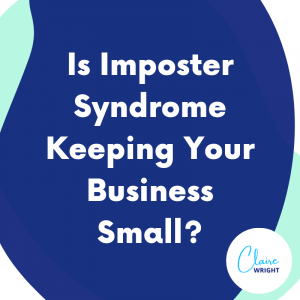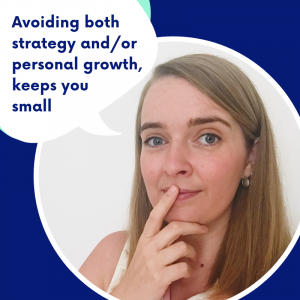It’s rare to meet a business owner who intentionally wants a small business. But when we avoid the work that’s what we unintentionally create. Whether that’s the strategy or the personal growth work, the result is the same. So I’ll ask is imposter syndrome keeping your business small?
This is the last in a series of three ways that imposter syndrome stifles the growth of your business and you. You likely don’t have them all in spades. But each in a little bit and some more than others. Review the tips to see if you could start addressing your imposter and remember awareness is the first step in making a change.
1. Luck
One of the major signs of imposter syndrome is that achievements are all chalked up to luck. I was just lucky. It was a fluke. I won’t be able to do it again. The message you send your subconscious in doing this is that responsibility for creating the result is external, outside your control. Now circumstances may well have come together favourable and other people may have been involved. But you still played a part, even if it was just showing up at the right moment.
Objectivity and imposter syndrome don’t exactly go hand-in-hand, but this is the best way to accept your part of the success. Objectively review what you did, however small or seemingly insignificant in creating the outcome. Then celebrate doing that and ask how you might be able to do more of that.
2. Avoid Experimenting
One thing our ego wants to avoid at all costs is validating those self-judgemental thoughts. And your inner critic and imposter are always willing to step in with a nasty ‘I told you so…’ like a 5-year-old child. This generally results in avoiding anything that doesn’t have a guaranteed outcome. But in business, especially in the beginning stages, nothing is guaranteed. It’s pretty much all an experiment. [I can’t say if this is still true in more advanced stages but I suspect it is…]
The reason we avoid experimenting is that failure is labelled as bad, terrible, horrendous and to be avoided at all costs. The thing is, that cost, is figuring out what works and what doesn’t work for you and your business. So if you avoid experimenting you won’t know if Facebook is a better platform for your business than Instagram or even LinkedIn. You won’t know if you get better engagement at 9am or 4pm. And so on.
Instead put failure in its rightful place, as part of growth, part of a quest to figure out what does work so you can do more of it and less of what doesn’t work.
3. Low Expectations
Imposter syndrome when you take away the questions really boils down to a fundamental belief of being capable, being enough to do the thing. Repeated thoughts of ‘you can’t’ dressed up in a million guises.
One quick and easy way to resolve that is to lower expectations. I’d love to make $10k a month but I don’t think that’s possible for me so I’ll be happy to make $3k per month.
Now stretch goals versus achievable goals is a whole different topic but is the bigger goals really, truly outside your capacity. Or is it just a reflection on what you are comfortable with now, at this moment in time? If you think, well it’s just not for people like me, go find people like you who have done things you’d like to do. Use them as inspiration, evidence that it is possible.
4. Playing Safe & Avoiding Risk
Similar to avoiding experimenting but playing safe and avoiding risk goes beyond just parts of your business. It’s more about subconsciously keeping your business small. If it’s just me then I never have to worry about paying anyone else. If I just sell a few then I never have to worry about dealing with lots of people. The thoughts always run along the theme of the smaller business is the ‘easier’ it will be, whether that related to stress, freedom, money even fame.
Underlying the playing small and safe mentality is a negative association to a perceived outcome. To start unpacking this you need to identify what negative consequences concerns your subconscious. Is it having to do regular bookkeeping? Or having to get outside help to keep up with demand? Figure it out and address it:
- Try finishing the prompt – If my business was successful I would have to… and add all the things you don’t want to deal with.
- Counter that by then asking, if my business was successful would it be worth dealing with that thing. So if my business was successful would it be worth doing regular bookkeeping?
- Lastly plan some mitigations to those consequences. How could you make it easier, get help, make it less stressful? I could outsource my bookkeeping. I could save 3 months of salary before employing someone else.
Is Imposter Syndrome Keeping Your Business Small…
Remember imposter syndrome doesn’t have to run [well ruin] your business. Addressing the concerns it raises is addressing the thoughts that happen just below your consciousness. Ignoring them doesn’t resolve them. There are limits and fears and unhelpful beliefs embedded within you, within everyone. It’s entirely possible to succeed with imposter syndrome, but if you can it’s very helpful to address the ways imposter syndrome is keeping your business small.
If you need help taming your imposter, identifying when it’s imposter syndrome and when it’s something else and harnessing the insights that your resistances have to offer then get in touch for a free chat about how we could work together.
Read the first and second five ways that imposter impacts your business.
Watch the Video
Pin for Later


